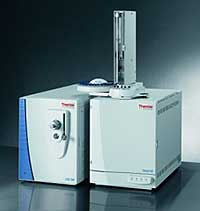Mar 13 2008
Thermo Fisher Scientific released ITQ Series of gas chromatography/mass spectrometry (GC/MS) ion trap instruments, featuring external ionization. The ITQ 700, ITQ 900 and ITQ 1100 ion trap systems feature fully upgradeable systems designed to provide high performance and high specificity. Developed for a wide range of applications, from routine GC/MS to research-grade ion trap MS, these new systems address the analytical needs of the environmental, food safety, pharmaceutical QA/QC, forensics and toxicology industries, as well as academic laboratories. As the leader in ion trap technology, Thermo Fisher is building on its rich heritage of innovation in mass spectrometry with the introduction of this comprehensive GC/MS series.
 ITQ Series of gas chromatography/mass spectrometry (GC/MS) ion trap instruments
ITQ Series of gas chromatography/mass spectrometry (GC/MS) ion trap instruments
Thermo Scientific ITQ 700 – Designed for routine full scan quantitation and general teaching applications, the cost-effective ITQ 700 GC/MS system combines full scan ion trap sensitivity with a small footprint for laboratories with limited space. The ITQ 700 is capable of achieving a mass range of 700 amu, suitable for most general GC/MS applications, including environmental, QA/QC and forensics.
Thermo Scientific ITQ 900 – The ITQ 900 incorporates best-in-class full scan sensitivity of ion trap mass spectrometry with the increased flexibility of the Thermo Scientific TRACE GC Ultra gas chromatograph. Combining a complete range of injector options including true Cold-on-Column, Programmable Temperature Vaporization (PTV) and a full complement of additional detectors, the ITQ 900 significantly expands the working mass range of a typical GC/MS system to 900 amu. The Large Volume PTV injection with back-flush option of the TRACE GC Ultra enables accurate detection of trace level components in complex matrices. This system enables users to perform routine full scan GC/MS with greater analytical flexibility.
Thermo Scientific ITQ 1100 – Offering the broadest selection of innovative new features available for ion trap GC/MS, the Thermo Scientific ITQ 1100 system features new advanced MS/MS (MSn) functions. These high performance ion trap-based GC/MS systems are ideal for laboratories seeking the most powerful GC/MS platform and optimal flexibility. For the first time, Thermo Scientific patented Pulsed Q Dissociation Mode (PQD) is available on a GC ion trap system. PQD increases the number of product ions formed during collision-induced disassociation (CID), yielding richer information for qualitative MSn experiments. The ITQ 1100 also features a 250 L/sec turbo-molecular pump, the Thermo Scientific Vacuum Probe Interlock and Data Dependent Scanning. This integrated system provides an extended mass range up to 1100 amu, considerably increasing the number of compounds that can be detected and identified.
In addition, the ITQ Series of GC/MS systems can be fully upgraded to maximize investment and offer the flexibility to cater to each analytical requirement. Detection capability can be improved using the MS/MS upgrade, while adding chemical ionization or direct sample probes allows increased flexibility. Injection options can also be expanded beyond split/splitless injectors to take advantage of advanced sample introduction techniques.